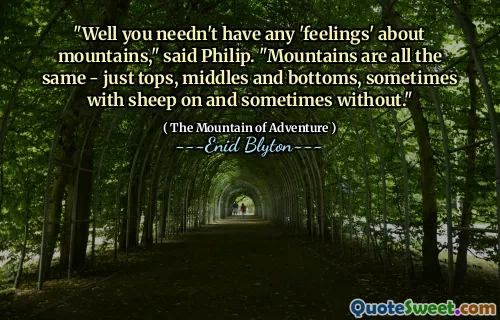
"Well you needn't have any 'feelings' about mountains," said Philip. "Mountains are all the same - just tops, middles and bottoms, sometimes with sheep on and sometimes without."
This quote from Enid Blyton's The Mountain of Adventure reflects a pragmatic and somewhat dismissive perspective on nature, specifically mountains. Philip's words suggest a view that strips mountains down to their simplest components, removing any romantic or emotional attachment. He categorizes mountains purely by their physical parts: tops, middles, and bottoms, with the addition of sheep as a variable element. This portrayal challenges the common literary tendency to see mountains as majestic, mysterious, or awe-inspiring. Instead, it invites readers to consider nature with a kind of practical indifference, focusing simply on the observable facts rather than the feelings they might evoke.
Reading this passage, one might reflect on the human tendency to impose emotions or greater meaning on the natural world. Philip’s viewpoint can be seen as a reminder that nature exists independently of human sentiment, and its components—no matter how grand or beautiful—are inherent in their physicality. Yet, this pragmatic perspective might also be grounding, helping to balance an overly sentimental approach to nature. It subtly encourages a recognition of reality, a factual observation that doesn’t diminish the mountain’s significance but places it in a clear, unromanticized context.
In essence, the quote highlights contrasting ways to relate to the environment. The factual, uncomplicated outlook emphasized by Philip may inspire readers to appreciate the simplicity and constancy of nature, as opposed to romanticizing or idealizing it. This serves as a thoughtful prompt about how people experience and interpret the world around them.




